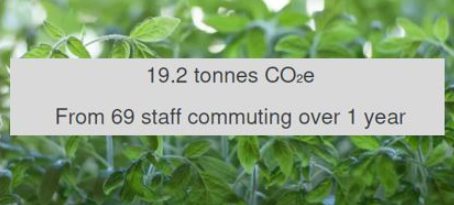In March 2020, Abley’s People and Places team ran a staff survey to measure how everyone commutes to the office. This is something we’ve been doing for a few years now, in order to measure change over time. The timing of this survey was significant: it was just before the COVID lock-down, a distant era when we very rarely worked from home.
The pie chart below shows our commuting trips over a typical week in March 2020 and includes working from home (which effectively represents avoided commuting trips).
Abley commuting trips (March 2020)

With 57% active travel (walking and cycling) and only 22% car-based journeys we are certainly seizing the opportunity that commuting represents for incorporating physical activity into our daily routines. Our commuting trips are 73.5% sustainable (walk, cycle, public transport, flexi-working), so also gentle on the climate.
Thanks to company-wide efforts over the years, staff at Abley know their travel options, and have access to adequate facilities (e.g. cycle parking and showers) in our offices. Our Christchurch team are overachieving with 51% cycling to/from work, on par with Amsterdam cycling to work levels! While it is a common finding in travel surveys that men tend to cycle more, at Abley women are as likely to cycle as men. This is the sign of a truly supportive cycling culture and environment.
So what about carbon emissions?

This is equivalent to 318 tree seedlings grown for 10 years, or 44.5 barrels of oil. Note that this represents the footprint of our commuting trips only, as business travel hasn’t been included at this stage.
Armed with this strong baseline, we cannot wait to see how much further our new flexible working policy will reduce our commuting emissions. The answer will come after our October pulse survey, watch this space!


.jpg?width=300&name=iStock-168396473%20(1).jpg)
